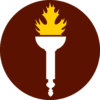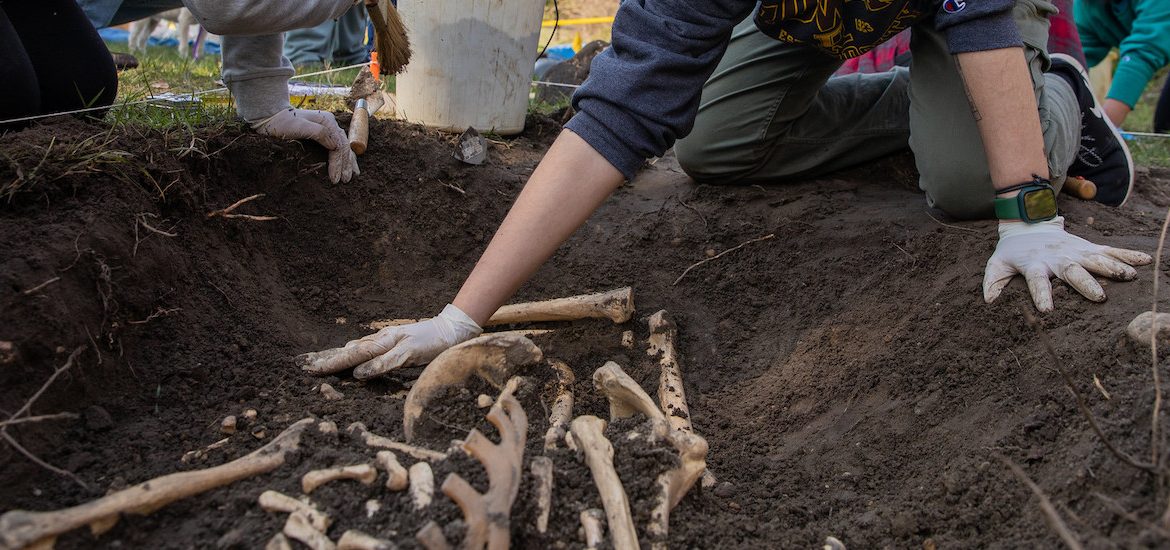Today we share moments from our conversation with students Archie Katz and Dawson Kipphut during a mock forensic anthropology dig, a project for their Forensic Anthropology class. We asked them about their favorite parts of their majors, the Forensic Anthropology course, and the specific responsibilities they had for this end-of-the-year project.
Archie Katz is a junior Anthropology major also obtaining a dual certificate of undergraduate study (CUGS) in Physical Anthropology and Public History. Archie is also a transfer student from Kennesaw State University in Georgia.
What got you interested in anthropology?
It is kind of odd because I started off wanting to pursue Culinary Arts with aspirations to be a Patissier [pastry chef]. However, I have always been interested in crime scene stuff like forensics. I took a forensics class in high school and although I had a strange teacher, I really enjoyed learning about forensics and those types of things. I did not want to go into the police force because I wanted to be involved in lab work. I wanted to be with the bodies, which might sounds morbid … but someone’s gotta do it!
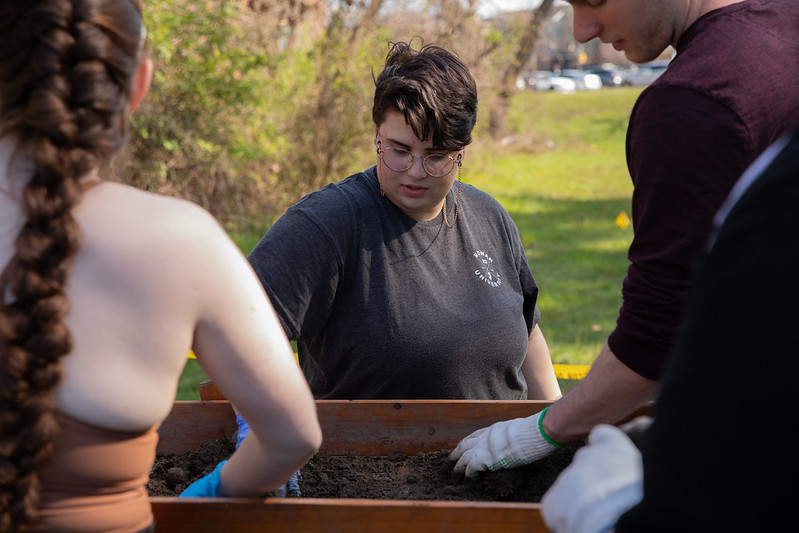
Can you talk specifically about the Forensic Anthropology class?
This is the lab course that is required for Forensic Anthropology [you need at least a lab], and what is going on right now is we are doing an excavation. Dr. Hill set up a whole entire scenario about her dog. The dog was let off his leash and found a bone, aka a patella, so we are trying to solve this puzzle and find the body it belongs to through an investigation.
In the class itself, we started off learning about the skeleton of the human body to familiarize ourselves with the body parts. Then we also had to learn the markers on the bones, which is the hardest part [that is Dr. Rosado’s part]. After this is Dr. Hill’s part which we are doing right now — the investigation and mock dig. This is where we learn more about forensic archeology, digs, setting up EDM’s (electronic distance measurer) and auto-levelers and, basically everything you need to set up at a crime scene to excavate it.
Is this your final project? What is your role for today’s investigation?
We could not do this project last semester because the class was online, but it is definitely one of the bigger projects we do within the course. On this project we are actually graded as a class and not individually and even though it isn’t necessarily our final test or last assignment, it does count for a decent percentage of our final grade.
Today we all got here at 8 a.m. and all of us within the class had time to sort out of specific roles within the project and get settled before starting our actual tasks. So basically my job is controlling the media and talking to any police that arrive on the scene and providing them with information about the scene. I am also in charge of sketching the scene with three other people.
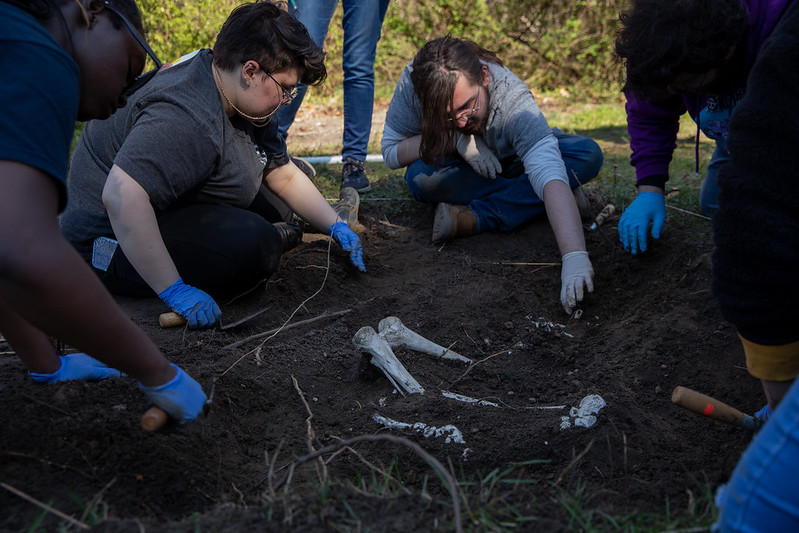
What is the most enjoyable part about this course and this class project?
It is really nice to develop relationships with my professors and get this field experience. In archaeology, if you want to go into the field you need field experience and you need to understand what to do in certain scenarios. You are more likely to get hired at museums and other places for this field by having field experience on your resume. I also am in a Public Archaeology class and the state archaeologist is the professor of the course, which is really cool. It is really great networking with different professors and even classmates that I could potentially be coworkers with in the future.
Why did you transfer to Rowan?
After I graduated from high school, I went to Kennesaw State University (KSU) for a year and they had some great classes, but I felt that I was too far from my family. So after I decided to come back here, I was weighing my options as I wanted to attend a four-year university where I could study anthropology, and I was seeking out a program that had very supportive professors.
I ended up meeting Dr. Rosado my first semester at Rowan through an online class I took, and she asked if I wanted to join her research group. This year there are only three students that are joining and I get to be one of them, so I am extremely excited. In January of next year we are even going to Chile for research!
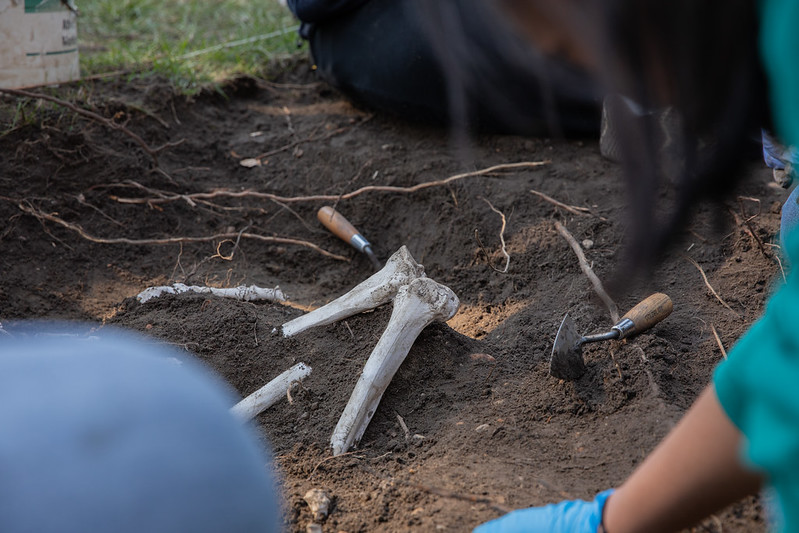
Can you talk about the professors in this major?
Drs. Hill and Dr. Rosado are super involved. Dr. Rosado does mostly paleo-archaeology and finds pathologies within bones. Dr. Hill does archaeology so she does a lot of mapping.
They are so eager to help us in our academic lives but also in our professional aspirations. We went on a field trip to The Mütter Museum at The College of Physicians of Philadelphia which was so fun but also extremely educational. I honestly couldn’t ask for better professors or for more support from them.
What happens after the body is exhumed?
After the body is exhumed and we take note of everything, we take the body back to the classroom in Robinson 205, also known as MARU [the Museum of Archaeology at Rowan University]. From here we basically figure out the gender, age and all the different information we need from the body. If this was reality we wouldn’t be doing this all in one day, but we are students so we will be completing these tasks all in one day!
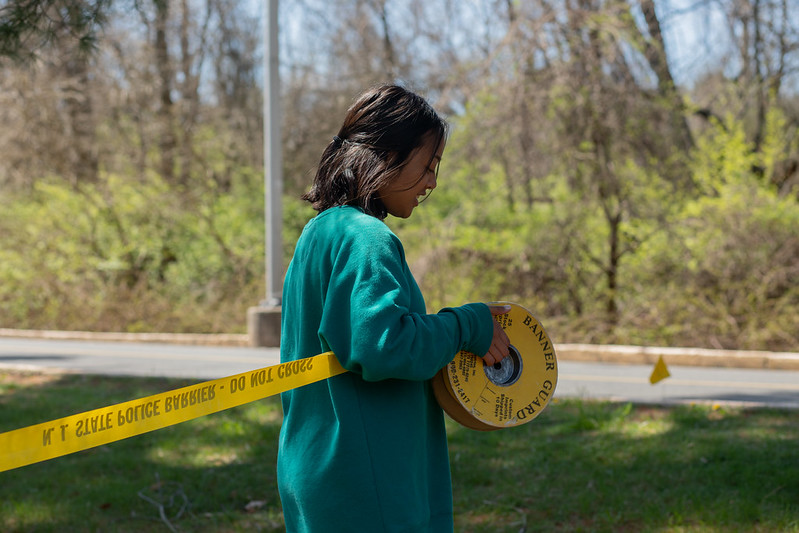
Dawson Kipphut is a tri-major in Law & Justice, Psychology and Philosophy. Dawson is a senior credit-wise; however, he will be returning to Rowan for another year to get the most out of his academic scholarships.
Can you talk about this mock dig project you are doing for your Forensic Anthropology class?
This project is the dig we have been preparing for for the entire semester. Everything we have done in class so far this semester has been to prepare for this dig project. This project is definitely very exciting as it is not something that you get to do on an average day.
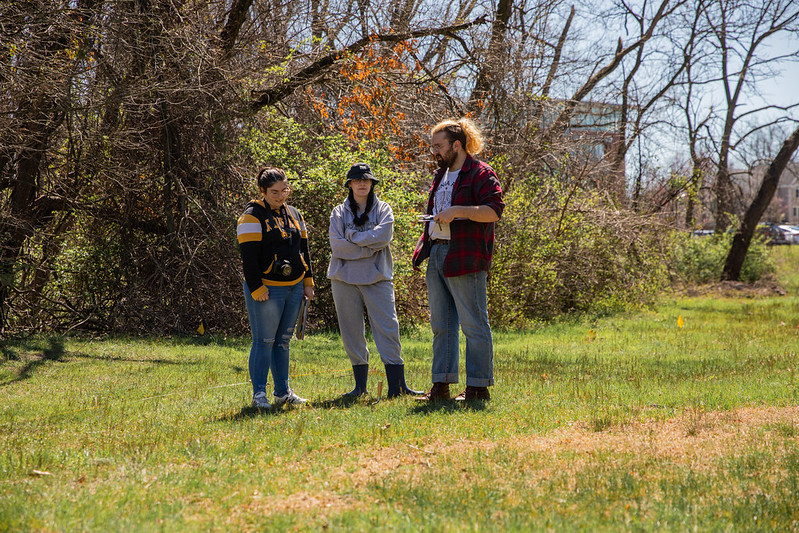
Can you talk about the process of today’s investigation?
We all relatively showed up around 8 a.m. At around 9:30 a.m., we headed out to set up camp. This is where I marked all the flags and made sure any missing evidence was cataloged. After that, we tried to set up one of the mapping machines and it was not successful, so that took up some time.
Then, eventually we finally got to digging and stuff was found within minutes of breaking through the ground. We found bone within both units and this either means the bones were very spread apart or that there are two bodies within this investigation … we just are not sure yet! We then took a break for lunch and then will return to dig up the rest of stuff below the surface hopefully before night fall!
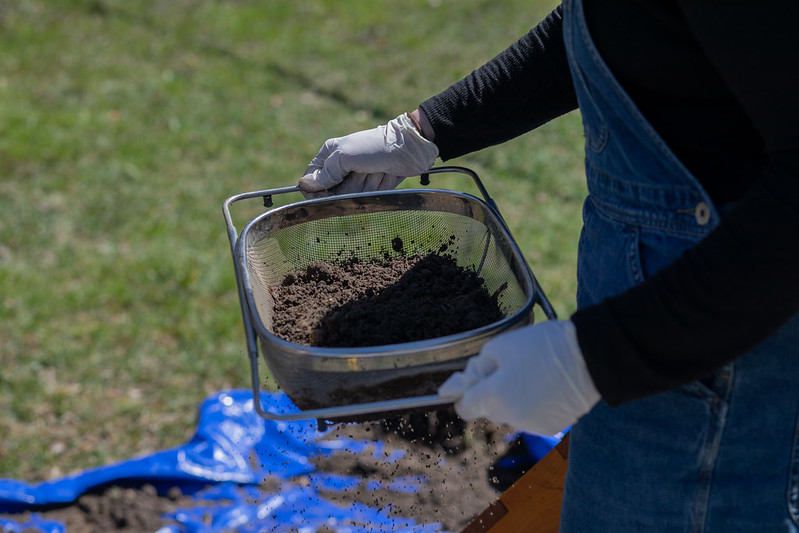
What is your job for this investigation?
I got the amazing task of basically directing the whole thing, which means I have been busy running around all day trying to keep track of people … it is very much like herding cats. I get to decide how we organize things and it is definitely a joyful process to be part of. At the end of the day, I kind of get to take pride in saying that I was a major part of this project. It has been truly an awesome experience.
What made you decide to take this class?
I want to go into law as my main profession; specifically, I want to be a public defender. Understanding forensic evidence would be very useful to challenge evidence, to make sure proper procedures are being taken, and to make sure that the evidence is being utilized fairly within a case.
Also, it just seemed like a very fun and interesting class. I knew this project was going to happen at the end of the semester and it just seemed very fun and something I wanted to be part of.
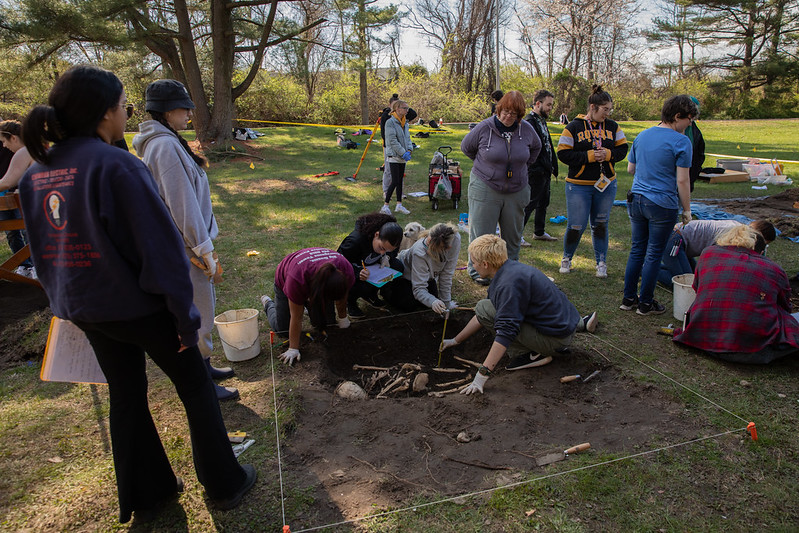
You talked about directing this project, can you talk about how important it is that everyone follows through with their own jobs so you can collectively meet a common goal?
Yes, everyone has their own tasks and jobs they are responsible for within this project. However, at some point, everyone has to do digging and sifting. It is important that everyone does their job at some point but not at all one moment. While mapping is taking place, photography might not be taking place and there are many jobs that do not happen simultaneously. It is important to also find people that may not be able to do their specific role at one point in time and redirect them to tackle something they can do to help move this project forward swiftly.
Can you talk about getting this experience as a student?
I never expected to have this type of experience as an undergrad in college. Having this experience of investigating a mock forensic dig is so interesting. Especially by coming in as a Law major and focusing on the court system, it has been an honor and a privilege to be able to gain this experience and knowledge in forensic digs.
Can you talk a little about the professors?
Drs. Hill and Dr. Rosado are amazing professors to work with. They are so funny, so charismatic, and truly hold your attention with every different topic they are teaching. The course is definitely challenging, but they have developed very engaging lectures and I never felt as if I did not know the information being presented to me because of how thorough they are with their teaching.
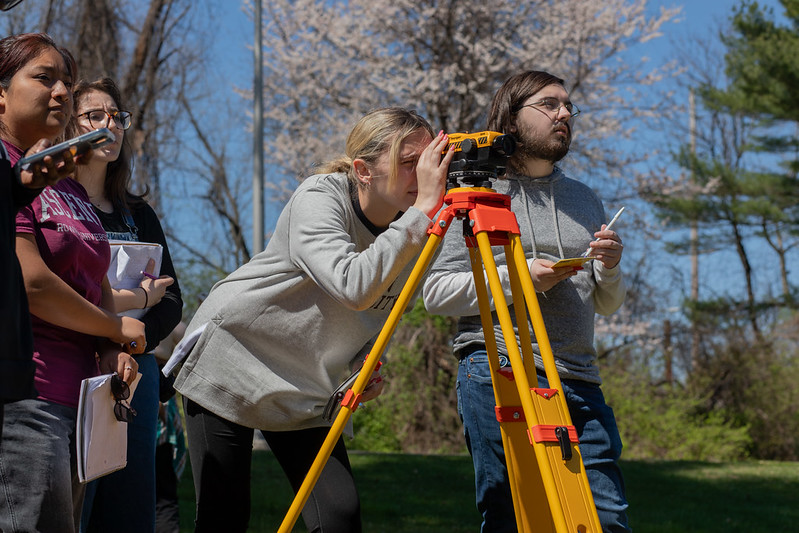
See more from the Forensic Anthropology class in this video.
Like what you see?
Story By:
Natalie DePersia, junior public relations major
